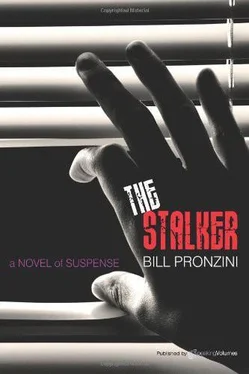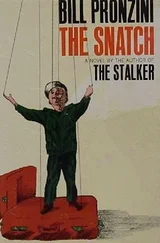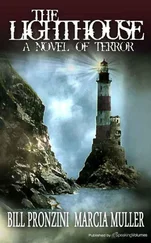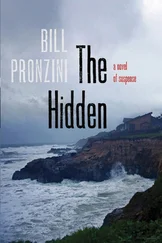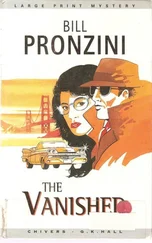Bill Pronzini - The Stalker
Здесь есть возможность читать онлайн «Bill Pronzini - The Stalker» весь текст электронной книги совершенно бесплатно (целиком полную версию без сокращений). В некоторых случаях можно слушать аудио, скачать через торрент в формате fb2 и присутствует краткое содержание. Жанр: Старинная литература, на английском языке. Описание произведения, (предисловие) а так же отзывы посетителей доступны на портале библиотеки ЛибКат.
- Название:The Stalker
- Автор:
- Жанр:
- Год:неизвестен
- ISBN:нет данных
- Рейтинг книги:4 / 5. Голосов: 1
-
Избранное:Добавить в избранное
- Отзывы:
-
Ваша оценка:
- 80
- 1
- 2
- 3
- 4
- 5
The Stalker: краткое содержание, описание и аннотация
Предлагаем к чтению аннотацию, описание, краткое содержание или предисловие (зависит от того, что написал сам автор книги «The Stalker»). Если вы не нашли необходимую информацию о книге — напишите в комментариях, мы постараемся отыскать её.
The Stalker — читать онлайн бесплатно полную книгу (весь текст) целиком
Ниже представлен текст книги, разбитый по страницам. Система сохранения места последней прочитанной страницы, позволяет с удобством читать онлайн бесплатно книгу «The Stalker», без необходимости каждый раз заново искать на чём Вы остановились. Поставьте закладку, и сможете в любой момент перейти на страницу, на которой закончили чтение.
Интервал:
Закладка:
Andrea began to scream.
15
He was the last one left.
Steve Kilduff, man alone.
He sat in the kitchen of the Twin Peaks apartment, and stared into the cup of black coffee. It was past dawn now, Thursday morning, and he could see, through the partially draped window-doors the length of the apartment, the gray sky with its dotting of gray-black clouds—tainted chunks of butter floating in tainted buttermilk.
And, as if superimposed on the bleak patina of the newborn day: Larry Drexel, lying on the cold wet grass—blackened and foully reeking and dead...
Himself, kneeling beside the charred body, now standing, now backing away...
The girl in the plastic raincoat, taking his place on the grass, burying her face in her hands...
Faces—featureless, oddly disembodied—watching the flames and staring at the dead man; pagan worshippers at the shrine of horror...
His car, ignition, brake, reverse, drive forward—going where?—going nowhere...
Police cars with flashing red dome-lights, and fire engines with high brightly yellow-white eyes...
Freeway lights, the same surrealistic montage of red and yellow, red and yellow, rushing forward, going nowhere as he was going nowhere, until fear sent him panicked onto an exit ramp to seek escape...
Interior shot: a cocktail lounge, locationless, nameless, dark, almost deserted, and the glass in his hand, trembling, full, and the glass in his hand, trembling, empty...
Dark, rain-swept, maze-like streets and roads and county highways, empty and strange, leading somewhere, yet leading nowhere, turn left, turn right, turn around...
Freeway again, an incalculable time later, the motion slower now, not so frightening, fewer yellows and fewer reds, and the rain had abated somewhat . . .
The dead, lonely streets of San Francisco under the first pale filtered light that signified the coming of dawn, daybreak of the morning after the final holocaust, and he was the lone survivor, the last man on earth, coming home...
He could see all of that vividly, but it was all in his mind, and in his mind, too, were the sounds, nightmare sounds of screaming and wailing sirens and driving rain and hurtling machines, and above it all were Larry Drexel’s brittle, dying, whispered words: “Helgerman . . . dead . . . long-time dead.”
He had been sitting there at the dinette for—how long? two hours? three?—sitting there and staring into the cold coffee, trying to keep from losing his grip on reality, from blowing his mind finally and irrevocably, feeling the awful pressure slowly but inexorably begin to lessen until, now, he knew a kind of unstable calm. He could look at the mental images, and hear the mental sounds, and there was no panic. He could be objective now, he could examine what had happened and determine its effect, he could be rational.
Helgerman is dead, he thought, it isn’t Helgerman; Drexel said it isn’t Helgerman and he was dying when he said it and there can be no disputation of the words of a dying man. So it isn’t Helgerman, Helgerman is dead, it isn’t Helgerman of the injured neck, Helgerman the wronged, Helgerman who had been struck down in the parking lot, Helgerman the only man it could be; it isn’t Helgerman. Then—who is it? Who pushed Jim Conradin off that cliff, and who set fire to Larry Drexel, and who murdered Cavalacci and Wykopf and Beauchamp? Who was waiting for him, Steve Kilduff, out there somewhere in the cold gray morning and in the dark black night? Who wanted him dead, as he had wanted and had made the others dead? What was the reason, the rationale, in a mind surely twisted?
Who?
And why?
But even more urgently important, what am I going to do now? Do I somehow seek out and somehow kill this now-nameless, now-faceless, non-existent but all-so-terribly-real madman—as Drexel would have done? Do I avenge the deaths of the others, and in so doing save my own life? Or do I go to the police, as I should have done in the very beginning? Or do I curl up in a tiny ball like a naked hedgehog and wait defenseless for whoever it is to come for me? Or do I run out of the state, out of the country, always looking over my shoulder, always trembling, always running?
What do I do?
The only thing I can do.
I’m not a killer, I never will be a killer, I could never find the man alone, and I would be as mad as he must be to believe I can. And I don’t want to die any more than any man wants to die; and the only place I could run—my eventual destination next week or next month or next year—would be off the deep end, right off the deep end. I have one alternative left, then. I go to the police. I go to Inspector Commac and Inspector Flagg and I tell them all about it, I tell them the whole story and I ask them to protect me and they will protect me and they will find the madman, whoever he is; I simply go to the police, and it’s over for me, it’s finished, no more fear, no more terror, it’s over.
But can I do it?
Can I go in there and pick up that telephone and dial that number and say the words that have to be said? Did what I saw and heard and smelled and was a part of last night—the horror of last night—somehow give me enough guts to do what I wasn’t able to do yesterday? Have I regained something of myself, a part of my manhood, that which enables a man to do what he must do?
Or is cowardice, once ingrained, not so easily dispelled?
Like a terminal malignancy, does it only spread until it consumes and destroys the being? And like that same malignancy, does it bring brief moments like these now—moments of painless calm, of commanding will, of hope—only to banish them, and return even more relentlessly destructive than before?
Kilduff got to his feet, pushing his chair back, and walked very slowly toward the hallway telephone. To find out if he was still a man.
It was just eight o’clock when Inspector Neal Commac stepped out of the elevator on the fourth floor of San Francisco’s Hall of Justice. He walked along the quiet hallway and through a doorway marked with the sign: GENERAL WORKS DETAIL. It was a huge room with pale plaster walls and a reception desk on his immediate right and several glass-fronted interrogation cubicles beyond an open archway. The detective bull pen contained several metal desks in no particular order, with typewriters on metal roll stands beside them.
Commac nodded a perfunctory good morning to the receptionist, turned to the right and then to the left to a doorway beyond, entering the bull pen. At the desk facing his, in the center of the room, Inspector Pat Flagg was just hanging up his telephone. Steam spiraled upward from a container of coffee at his elbow. He looked up as Commac took off his hat and sat down.
“Morning, Neal.”
“Pat.”
Flagg indicated a covered container identical to the one on his desk, resting on Commac’s blotter. “Brought you some coffee.”
“Thanks,” Commac said gratefully. “I could use some. It’s a bear out this morning.”
“We’re in for a hell of a winter.”
“Yeah.” Commac slipped the plastic cover off the container and tasted the coffee. He made a wry face and looked at Flagg over the rim of the container. “What’s on tap?”
“So far, just a talk with Mr. Brokaw on that attempted extortion in Sea Cliff.”
“Any special time?”
“After eleven.”
“Okay.”
“Oh, and the DMV report came back on that ’59 Personnel Roster we got from the Bellevue Air Force Station.”
“Anything?”
Flagg picked up a printed form from his blotter. “Six with registered automobiles in California,” he said. “Conradin and Kilduff; Thomas Baird, North Hollywood; Lawrence Drexel, Los Gatos; Dale Emmerick, Redding; Victor Jobelli, Yreka.”
Читать дальшеИнтервал:
Закладка:
Похожие книги на «The Stalker»
Представляем Вашему вниманию похожие книги на «The Stalker» списком для выбора. Мы отобрали схожую по названию и смыслу литературу в надежде предоставить читателям больше вариантов отыскать новые, интересные, ещё непрочитанные произведения.
Обсуждение, отзывы о книге «The Stalker» и просто собственные мнения читателей. Оставьте ваши комментарии, напишите, что Вы думаете о произведении, его смысле или главных героях. Укажите что конкретно понравилось, а что нет, и почему Вы так считаете.
